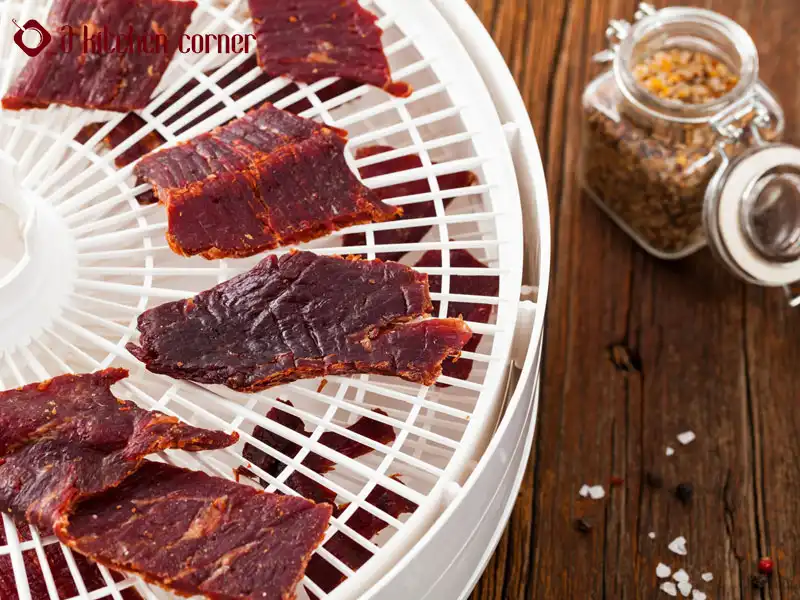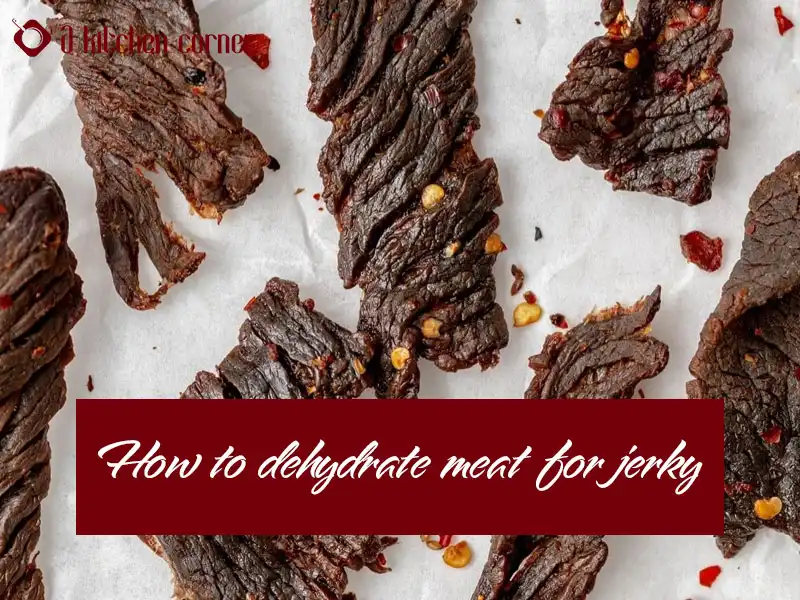
In search of how to dehydrate meat for jerky? Find out how to create beef jerky in a dehydrator with step-by-step instructions. This article covers selecting the meat to use, slicing it, marinating it using a fantastic recipe, dehydrating the jerky, and testing it to see when it’s done.
Contents
What meats can be dehydrated? Tips for choosing meat
You can dehydrate any raw meat or canned, but each type of meat requires different pre-treatment. Personal preference determines the best kind of meat to dehydrate.
The easiest way for many people to choose which meat is their favorite is to try it because there are wide varieties available. Suggestions for the best meat include turkey, beef chops, and other possibilities.
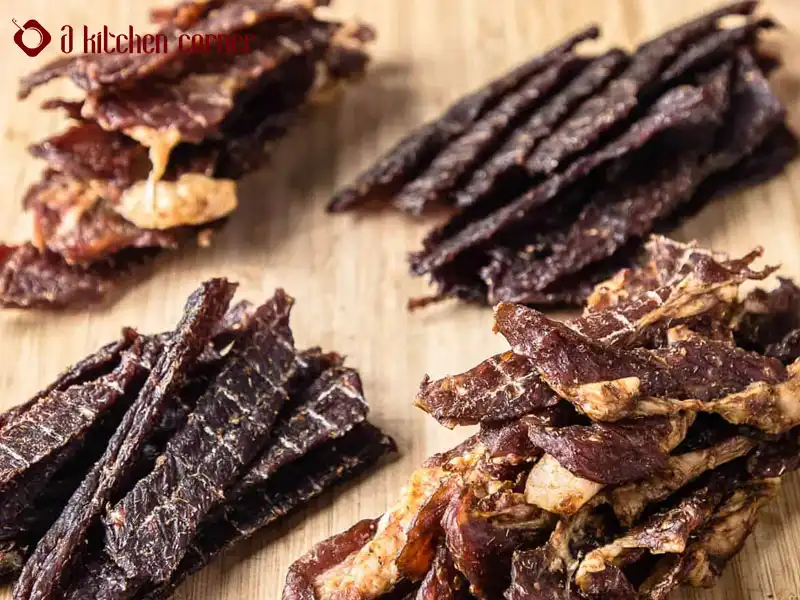
You can dehydrate any raw meat or canned
Beef, lamb, deer
Lean and fat sections can be found in red meats like beef, lamb, deer, and bison. While the lean portion dries out reasonably well, the fat portion quickly goes rancid.
Only lean cuts should be dried in order to reduce this, and all fat should be taken out before drying. If you’re working with venison, you must ensure the carcass is correctly dressed to prevent feces from getting inside; if unsure, don’t dehydrate the venison.
Chicken or turkey
Only perfectly fresh slices of chicken or turkey should be chosen for dehydrating; poultry sitting around in the butcher’s meat case should not be utilized.
Due to its excessive fat content, duck and goose meat is typically not dehydrated. However, skinless breast flesh can be used for jerky according to beef’s directions.
Ground red and poultry meat
While lean whole-muscle meat has more fat than ground red and poultry meat, it is nevertheless possible to dehydrate it using specific techniques. The dried ground meat can be safely transported on a camping trip while maintained at room temperature for a week or two. Still, it needs to be chilled or frozen for extended storage.
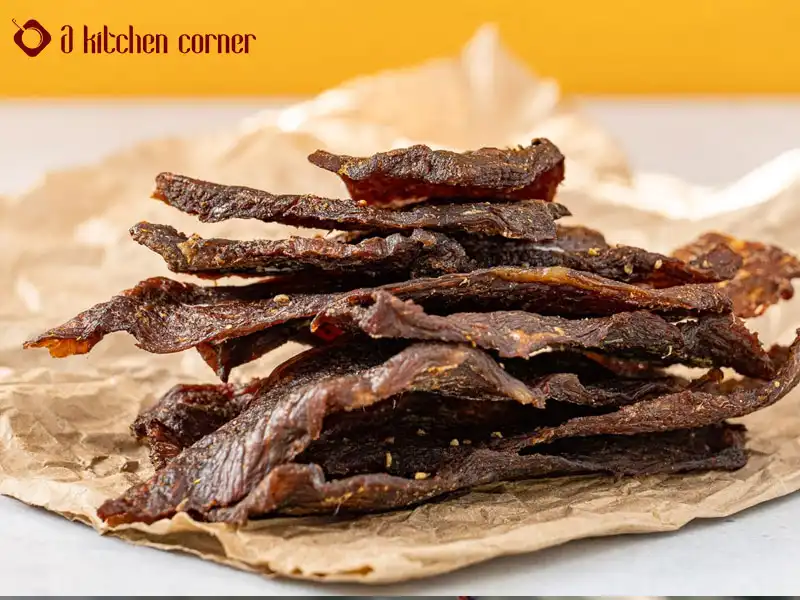
Dehydrated red and poultry meat
Pork
Due to their high-fat content, most pig chops don’t dehydrate well, however, lean ham and Canadian-style bacon can be dried.
Cooked roast leftovers
As long as they are handled appropriately, cooked roast leftovers can also be dehydrated. Fatty roasts, those boiled in gravy or a thick sauce, or those allowed to rest on the sideboard for hours before being refrigerated are not good candidates for dehydrating.
Cut leftover cooked roasts into cubes after slicing 1/4 to 1/2 inch thick, then make as directed after skipping the cooking stage.
How to dehydrate meat for jerky?
You can dehydrate with or without a dehydrator, so if you are looking for how to make jerky at home, look at the following section.
How to dehydrate meat in a dehydrator?
Were you looking to make your jerky at home? Here, follow step-by-step instructions to dehydrate meat in a dehydrator.
- Step 1: Pick a lean cut of beef that is in superb shape. Delete the skin and bones (for poultry).
- Step 2: Trim away visible fat and discard any tissue with a filmy membrane. It’s crucial to trim meat properly. Remember that fat doesn’t dry out and can eventually go rancid.
- Step 3: Cut into 1/4-inch-thick slices or strips (6mm).
- Step 4: Refrigerate for 6 to 12 hours while marinating.
- Step 5: Pre-cook beef to a temperature of 160–165°F/71–74°C by roasting or steaming it. This process guarantees that all bacteria will be eliminated before drying.
- Step 6: Spread on dehydrator trays after rinsing. Dehydrate for 4-6 hours at 145F/63C until rigid and with no moisture pockets present. When done, the meat should be partially brittle or dry-leathery.

How to dehydrate meat in a dehydrator?
How to dehydrate meat without a dehydrator?
Without specialized tools like a dehydrator, jerky can be prepared at home. A home oven can dehydrate more food at once than most commercial dehydrators with only minor tweaks. How to dehydrate meat in oven? Here are the steps to follow:
- Step 1 – Choose meat: Any beef can produce jerky, but since you won’t require the suppleness of an expensive cut like a filet mignon, it makes sense to choose a cheaper amount.
- Step 2 – Trim Fat: Remove all visible fat from the meat.
- Step 3 (Optional) – Partially Freeze Meat: If you don’t need the food right away, partially freezing the meat for a few hours can stiffen it up and make slicing considerably simpler.
- Step 4 – Slice Strips: Slices between 1/8 and 1/4 inch thick are suitable. Less time will be needed for dehydration if the strip is thinner, and your jerky may be “chewier” if the strip is broader.
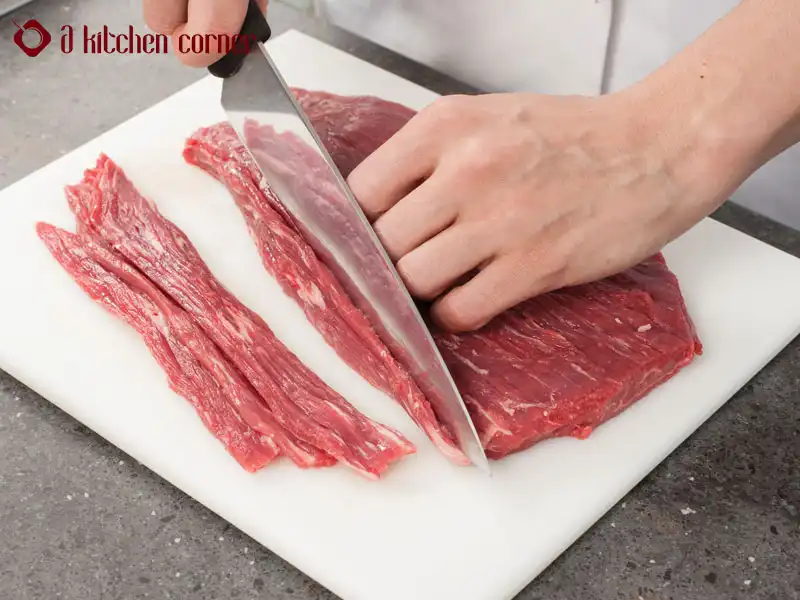
How to dehydrate meat with an oven – Step 4 – Slice Strips
- Step 5 – Spice up the meat: To enhance the flavor of the original cut of meat, use a straightforward marinade of salt, pepper, water, and vinegar.
- Step 6 – Open the vent door and the oven: The oven temperature should be set as low as it will go. The ideal temperature for dehydrating food without cooking it is 140 degrees Fahrenheit.
- Step 7: Check for doneness: After roughly two to three hours. Take a jerky stick and bend it. It needs extra time if it turns readily or feels moist.
- Step 8: Remove and allow cooling: Remove and let the jerky dry naturally. Put off packaging it right now. At room temperature, it will dehydrate in 24 hours, but you can begin eating it right away.
How to dehydrate meat? Some pro tips for you
When drying meat for beef or deer jerky, there are a few pro tips to keep it tender when rehydrating it.
- Partially freeze the meat before slicing, or you should use a sharp knife.
- You can use fewer ingredients when using a ziplock bag, reducing the cost of marinades. Place the meat in the ziplock bag, twist it, and let the air out. This enables a relatively minimal amount of marinade to cover all the meat.
- The flavor of the jerky will increase with the amount of marinating time. If I have the time, I marinate my meat for at least 18 hours.
- Take the jerky strips out of the dehydrator and let them cool for five minutes before determining whether they are ready. When done, it ought to bend and crack but not break. When the meat is bent, white fibers should also be visible.
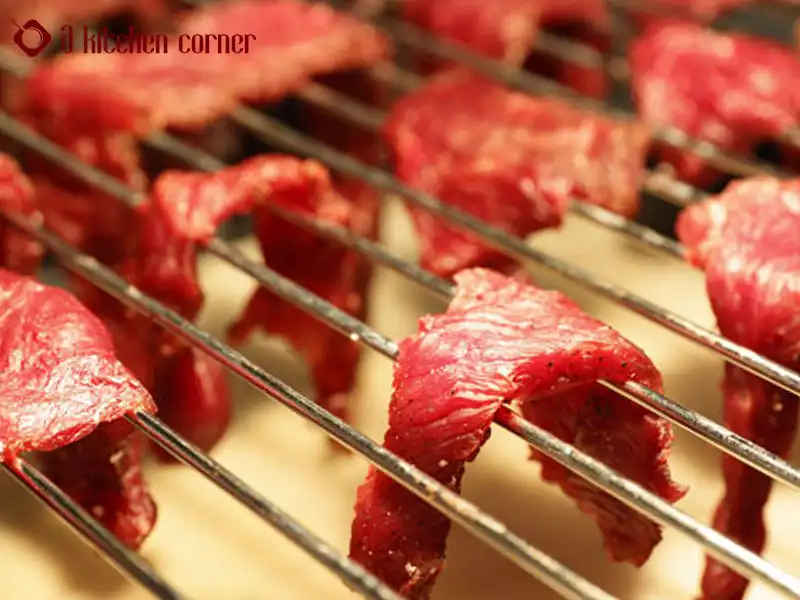
The flavor of the jerky will increase with the amount of marinating time
FAQs
Can you dehydrate raw meat?
Raw meat shouldn’t be dried out. The dangerous germs commonly present in raw meat cannot be destroyed at the temperatures used in dehydrators and ovens. Food poisoning or other severe illnesses may result from this.
How long does it take to dehydrate meat?
Most cooked meats will require 6 to 12 hours to dry completely. If any oil appears during the dehydration process, pat it dry. The same process can be used to dehydrate cooked ground beef.
How to use dehydrated meat?
Jerky can be had as a snack, in the lunchbox, or when out trekking. On lengthy journeys and flights, we eat jerky. When traveling, it’s not always simple to find gluten-free food options, so jerky is a decent fallback. It is portable.
By rehydrating jerky, it can also be utilized in meals. For a 30-minute soak to rehydrate, mix 1 cup of jerky chunks with 3 cups of water.
I like to toss this soaking water and add new water for cooking because the jerky has a lot of salt after dehydration. Then, boil or simmer the stew or soup as usual.
Snacks from a dehydrator are ideal for taking on a trip or use during outdoor summer activities. They don’t need to be refrigerated, won’t melt in the heat, and may be stored without going bad for several weeks.
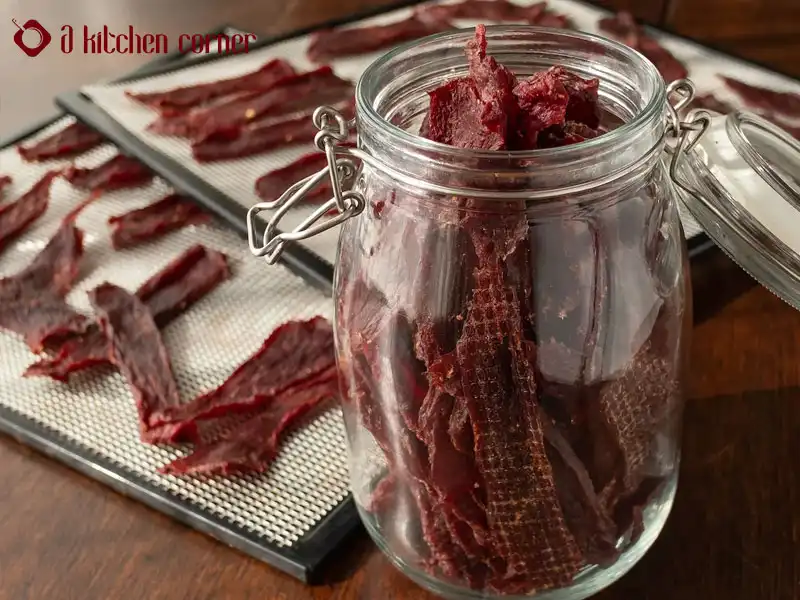
You can store dehydrated meat in jars
Since they are produced from whole, unprocessed foods, they are also inherently nutritious and low in sugar.
How long will jerky last?
Home-made dried jerky isn’t chemically processed to extend its shelf life. If the jerky is kept at room temperature, it needs to be eaten within two weeks of being made. The jerky you prepare for a camping or driving trip keeps well without refrigeration for around two weeks.
Put the jerky in the freezer in a sealed bag for extended storage. The minimum shelf life of jerky is six months in the freezer and one month in the refrigerator.
Getting ready to dry
You can dehydrate any meat to extend its shelf life and decrease food packaging. You can feel more ready and secure if you prepare your jerky for outdoor activities and long- or short-term emergency storage.
Now you get how to dehydrate meat for jerky? Do you feel prepared to begin dehydrating? Please visit our product page for additional details on electric food dehydrators of all sizes.


